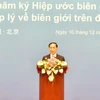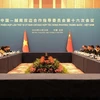Vietnam’s defence diplomacy has developed continuously over the past years, contributing to the implementation of the country’s foreign policy of openness, multilateralisation and diversification.
Following the Party and State’s guidelines to actively integrate into the international community and safeguard the country in the new context, the army pursued a comprehensive policy of defence diplomacy, strengthening international integration in this field.
As a result, Vietnam intensified links with neighbouring states to create a security belt along the country’s boundaries, thus helping to safeguard national independence, sovereignty and territorial integrity.
Vietnam has so far established defence ties with 80 nations and international organisations, including the United Nations and the European Union.
Defence attaché offices have been set up in 29 countries, while 45 foreign defence attaché offices are currently active in Vietnam.
Since 2006, the Vietnamese army has actively participated in the annual ASEAN Defence Ministers’ Meeting (ADMM), contributing to the consolidation of the bloc’s central role in the regional security architecture.
Furthermore, Vietnam sent military officers to participate in the ASEAN Militaries’ Humanitarian Assistance and Disaster Relief Exercise in Brunei in 2013 and took part in the UN’s peacekeeping operations this year.
At regional forums, the army contributed to discussions and expressed viewpoint to win support for the country’s sovereign and legitimate interests, including the promotion of the settlement of the East Sea issue via peaceful means on the basis of respecting the United Nations Convention on the Law of the Sea and the Declaration on the Conduct of Parties in the East Sea.
Military units also stepped up exchanges and cooperation with other countries’ localities and armed forces, as well as coordinating with neighbouring border guard forces to patrol and manage shared borders and border posts.
Thanks to diplomatic efforts on defence, Vietnam received the support from other countries in terms of capital, science-technology and modern military knowledge in order to improve the capacity of the country’s defence system and national strength.-VNA
Following the Party and State’s guidelines to actively integrate into the international community and safeguard the country in the new context, the army pursued a comprehensive policy of defence diplomacy, strengthening international integration in this field.
As a result, Vietnam intensified links with neighbouring states to create a security belt along the country’s boundaries, thus helping to safeguard national independence, sovereignty and territorial integrity.
Vietnam has so far established defence ties with 80 nations and international organisations, including the United Nations and the European Union.
Defence attaché offices have been set up in 29 countries, while 45 foreign defence attaché offices are currently active in Vietnam.
Since 2006, the Vietnamese army has actively participated in the annual ASEAN Defence Ministers’ Meeting (ADMM), contributing to the consolidation of the bloc’s central role in the regional security architecture.
Furthermore, Vietnam sent military officers to participate in the ASEAN Militaries’ Humanitarian Assistance and Disaster Relief Exercise in Brunei in 2013 and took part in the UN’s peacekeeping operations this year.
At regional forums, the army contributed to discussions and expressed viewpoint to win support for the country’s sovereign and legitimate interests, including the promotion of the settlement of the East Sea issue via peaceful means on the basis of respecting the United Nations Convention on the Law of the Sea and the Declaration on the Conduct of Parties in the East Sea.
Military units also stepped up exchanges and cooperation with other countries’ localities and armed forces, as well as coordinating with neighbouring border guard forces to patrol and manage shared borders and border posts.
Thanks to diplomatic efforts on defence, Vietnam received the support from other countries in terms of capital, science-technology and modern military knowledge in order to improve the capacity of the country’s defence system and national strength.-VNA



















